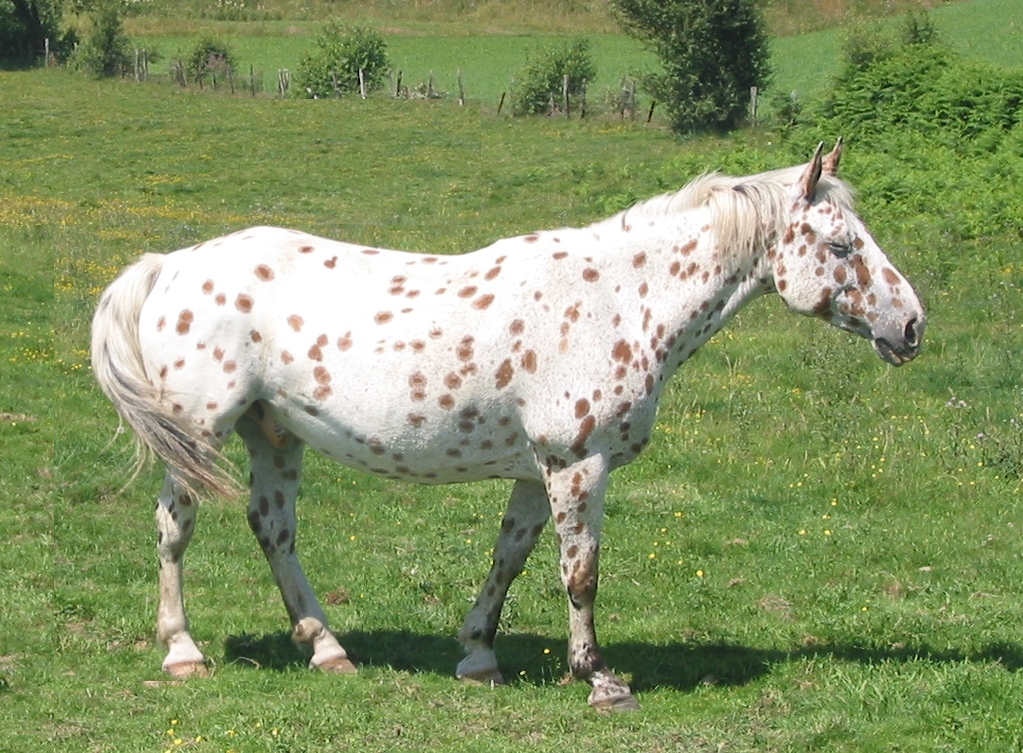Appaloosas are impressive horses, even if they are “few spot Appaloosas” and have a few hard-to-spot spots. They're impressive to look at, impressive to ride and impressive in their characters about the barn. They also have an impressively sobering history linked to the near-extermination of the Nez Perce tribe. But if you want to bring an Appaloosa home, you need to be aware of their most common health issues.
Sunburn
Appaloosas that are predominately white, such as those who sport the leopard spotted pattern, are more prone to getting sunburn than horses of darker colors. They get sun burnt especially on any areas of pink skin, such as the muzzle, lips, ears and genitals in stallions and geldings. Even if the skin is mottled grey and pink, it still can get sunburnt. If a horse’s skin is constantly damaged by sunburns, it is prone to getting skin cancer.
Human sunscreen products that are safe to use around the eyes would be safe enough to protect your Appaloosa from sunburn. You also want to be sure there is shelter in their fields and paddocks. If possible, keep pink-skinned Appys indoors during the hottest parts of the day.
Night Blindness
Horses can see very well in the dark unless they have night blindness. Although not the most traumatic thing that can happen to a horse, night blindness can make a horse accident prone. A one thousand pound animal getting into an accident can prove to be traumatic, indeed. So far, night blindness has only been discovered in Appaloosas. It is thought that the gene that is responsible for the Appaloosa's spots can also cause night blindness. But few spot and "snowcap" Appaloosas can still be born night blind.
Congenital stationary night blindness tends to not get worse as the horse gets older, but you do have to arrange for the horse to either be close to a "seeing eye" horse or to be stalled all night. You definitely have to curtail riding at night. Lightning flashes can also make the horse temporarily blind. Usually an Appaloosa is born with the condition, but we are still in the early stages of learning about it.
Total Blindness
A 2006 study by the University ofMinnesota concluded that Appaloosas were eight times more likely to gocompletely blind than any other breed of horse. This might also be due to genetics, but so far, the reason why a horse gets this disease is unknown. Appaloosas seem to be more prone to contracting a disease called ERU (Equine Recurrent Uveitis) which then causes the blindness. This is also called "moon blindness". Not all horses with ERU go completely blind.
Although blind Appaloosas can be great companions and can be used in riding and pulling carriages to some extent, most people do not want to deal with them and just have them put down. More and more, people are opening their eyes to the fact that living with a blind horse isn't too much different than living with a sighted horse.
Additional References
- Horse Health and Nutrition for Dummies. Audrey Pavia & Kate Gentry-Running, DVM, CVA. John Wiley & Sons; 2008.
- The British Appaloosa Society. “Health Matters.”
- BlindAppalosas.org
Image from Wikimedia Commons


I had no idea that appalosas were more prone to certain health issues.
ReplyDelete